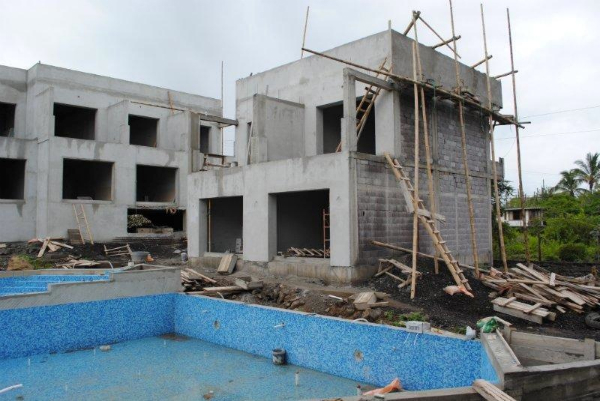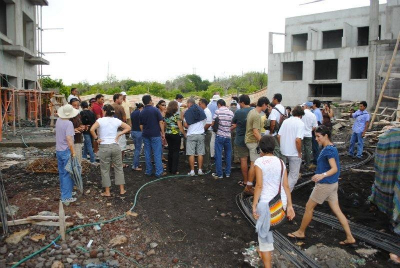Write the word "Galápagos" in any search engine and up will come thousands of links to Darwin, evolution, pristine islands, unique species, tortoises, iguanas, sea lions, blue-footed boobies, premier place to visit before kicking the bucket, etc. Seldom does one see a mention of the people who live on the islands -- Homo sapiens, the one introduced species that continues to have the most powerful impact on the archipelago.
Faced with the dichotomy of trying to protect this unique environment and tend to the needs of its human population, in 1998 the government of Ecuador approved the Galápagos Special Law, a series of sweeping protective measures that would, among other things, establish zoning regulations to
...ensure the conservation of the natural areas, on land and sea, as well as the development of surrounding human settlements, and take legal action to promote a harmonious relationship with the people established in the province of Galápagos.
Enforcing the law has proved anything but harmonious. Several groups, including fishermen, tour operators and some local politicians, expressed strong opposition to the environmental restrictions imposed by the legislation. On the other side, the National Park, the Darwin Foundation and other environmental organizations supported the law. Most local residents remained somewhat silent.
So imagine my surprise when I found a Facebook group "Quiero que en Galápagos se respete la ley" (I want respect for the law in Galápagos) and an invitation to an event May 12th in Puerto Ayora, Santa Cruz Island: "Marcha Pacifica -- Juntos por un Galapagos mas Justo" (Peaceful March -- Let's unite for fairness in Galapagos). As a native Galapagueña and a frequent visitor to my birthplace, I try to keep abreast of developments there. This movement that utilized social media and crowdsourcing as organizing tools intrigued me. So, I set out to discover its origins.

After a few emails, Facebook messages and phone calls, I located several Santa Cruz residents connected to the protests (they want to remain anonymous because they say they fear reprisals). They state that a year ago a large construction project began in Puerto Ayora in an environmentally sensitive area adjacent to the National Park; close to the beach, a lagoon and the area's last large mangrove forest.
Permits to build private homes in the urban area of the inhabited islands are issued by the local municipality. However, permits for hotel construction need an environmental impact report and permission from the Galápagos Governing Council and the national Ministries of Environment and Tourism.
The size of the construction aroused suspicions. It is a complex of two 3-story buildings plus a 2-story structure with a total of 26 rooms and a large swimming pool," said one source, adding there were rumors that the project is really a hotel.
That prompted the residents to alert the authorities. Some time later, the Director of the Galápagos National Park, Biologist Edwin Naula stated on his Facebook page and on the Galápagos National Park website "We have stopped construction on a site that had a permit as a private home but is evidently a hotel." But that was not the end of the story. Far from it.
The owners of the property, Mauricio Ponce-Cartwright and his company PONCA S.A., came back swinging:
"It is a residence, not a hotel, and we have obtained the proper permits from the Puerto Ayora municipality" Mr.Ponce said. As for the size of the construction, he added, "We are a very large family," saying that relatives and friends would occupy the buildings.
However he would not rule out the possibility of converting the property in the future into a hotel stating that: "If I should ever decide to do so I will get all the proper permits and environmental studies". In the meantime, he has started legal proceedings against the National Park claiming that it has no jurisdiction over the urban areas of Galápagos. Construction on the site continues as the matter awaits resolution.
 As evidenced by their Facebook activity the residents have not remained idle. In fact, this case is serving as a rallying point. They have used "crowdsourcing" to get people to show up at the construction site when a judge conducted an inspection. They also attended a rally to press their case during President Correa's recent visit to the island. And they created a Facebook event to call residents to participate in the May 12th Peaceful March, because as one organizer puts it:
As evidenced by their Facebook activity the residents have not remained idle. In fact, this case is serving as a rallying point. They have used "crowdsourcing" to get people to show up at the construction site when a judge conducted an inspection. They also attended a rally to press their case during President Correa's recent visit to the island. And they created a Facebook event to call residents to participate in the May 12th Peaceful March, because as one organizer puts it:
"We are going beyond this case. We want the authorities to respect and enforce the laws. We want them to help us live a good life in a sustainable way that does not harm this wonderful place. We will no longer stand by and see the law and our rights ignored"